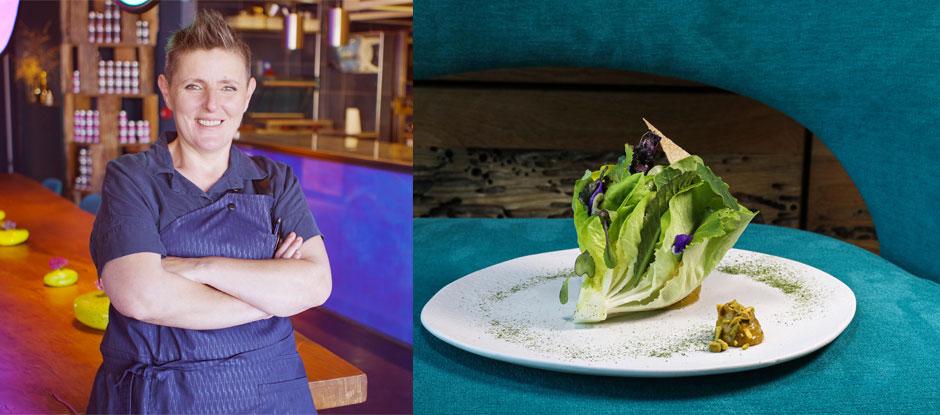Italian chef Viviana Varese learnt first-hand how being ‘different’ can hinder a career in hospitality. Through her two restaurants and a new ice cream parlour project, she is showing the world how gastronomy can help break down barriers among individuals from all backgrounds, while campaigning for a more inclusive restaurant model. After meeting Kurt Evans last week, 50 Best profiles the second of its three Champions of Change award winners, presented in partnership with S.Pellegrino
Viviana Varese doesn’t like to think about diversity as a range of social and ethnic backgrounds or genders, sexual orientations and religious beliefs. At her restaurants in Milan and Noto, Italy, diversity is simply the value of being unique. “Each person has their own value and together we create a team that is more cohesive, more fun and more creative,” she says of her hiring policy that has seen her collaborate with individuals from all walks of life, from refugees to retired farmers and former drug addicts.
For the 47-year-old cook, the seed of diversity was planted when she realised that she herself was one of those often considered ‘different’. Born on Italy’s southern Amalfi coast, Varese and her family moved to Milan when she was seven. By age 13, she was working at her parents’ restaurant as the pizza chef, weighed 130kg and had already endured fat-shaming and the discrimination perpetrated in Italy’s northern regions against those coming from the south – all before she came out as a lesbian at the age of 25.
Hospitality, however, was always in Varese’s blood, ultimately becoming the tool through which she chooses to extend a lifeline of inclusion to the individuals she employs. In the early 20th century, her grandfather Vitale Varese founded Varese Bar in Salerno, near Naples – a local institution that operated for 70 years. Upon arriving in Milan in 1981, Varese’s parents too opened a restaurant where the young cook received her culinary education, first as a form of entertainment and later as a profession.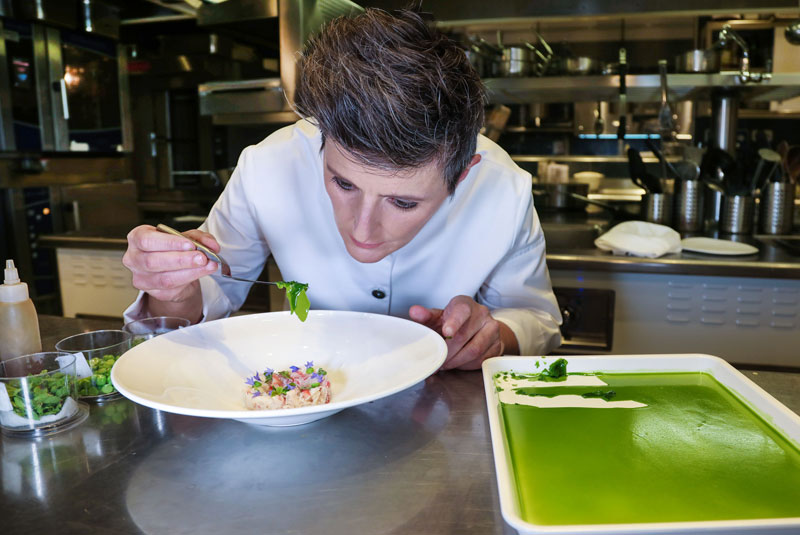
The chef puts the final touches on a dish at restaurant Viva in Milan (image: Azzurra Primavera)
Varese was only 19 when she launched her first company, which made liquor. “I was a southerner and really obese, so I was a bit of an outcast and my only weapon in life was to be ambitious: I wanted to prove that I could make it,” she recalls. The project lasted a year, then the young cook joined a small restaurant and pub, becoming the chef in charge of a team of five within 12 months. Seeing that cooking was a medium through which she could prove herself, she started to aim higher, landing a stage with iconic Italian chef Gualtiero Marchesi at the restaurant of L’Albereta luxury hotel in Franciacorta.
It was around this time when Varese noticed that she had yet another difference to her peers. At L’Albereta, she was one of only two women in the kitchen – the other being, of course, a pastry chef. After opening her first restaurant in Milan aged 21, where she continued her parents’ legacy of simple seafood cuisine and pizza, she sought other stage experiences in renowned Italian kitchens, but her list of rejections kept growing longer.
“I realised I had to study as an autodidact,” she says. “No one would take me into their kitchens because 25 years ago, it was basically forbidden to put a woman on the team.” But there was yet another problem. “Back then, cookbooks were all wrong. Recipes had to be secret, there was no sharing of knowledge and no internet, no tutorials that would allow you to learn new techniques or deepen your knowledge. And cooks tended to be fat and alcoholics – there wasn’t that figure of the thin, philosophical cook that is celebrated today.”
Remodelling the restaurant
Ever the ambitious woman and now armed with years of self-study, Varese closed her first place and opened a new, more progressive restaurant in Milan in 2007, named Alice. “I still remember the first article that came out a month after opening,” she reminisces. “It was by a journalist named Marco Gatti, who wrote for Italian newspaper Libero Quotidiano. The headline was ‘They will be famous: take note of these names’. After that, 80 articles about the restaurant came out within six months. I wasn’t sleeping any more, just trying to look after this crazy horse of a restaurant that I could not tame.”
Meet Varese in the video:
The turning point for Varese came when, through an acquaintance, she landed a stage at two-time winner of The World’s Best Restaurant award, El Celler de Can Roca in Girona, Spain. “There, all knowledge was available to everyone, there was none of that Italian attitude of secrecy,” she says. “There were head chefs and sous chefs, but it was less militarised, less cruel than the model of French haute cuisine, much more modern and organised.”
When recalling her experience at El Celler de Can Roca, Varese compares it to some of the stages she continued to do years later, even after she received a Michelin star for Alice in 2010. Working at one restaurant in the US, she recalls, “was like being in the Marines, with much testosterone and adrenaline in the kitchen. There was even a team of exploited Mexicans who worked from five in the morning to 2am every day. That restaurant showed me everything I didn’t want to be.”
At her own restaurant, Varese sought to apply a different system. “I started to receive more and more CVs not only from women, but also from those who identify as homosexual, women and also men who had been mistreated in other kitchens for coming out in such a male chauvinist environment,” she says. “We started to create a team that was gender-balanced, with the female presence sometimes exceeding the male presence.”
In the meantime, Alice’s success was being increasingly recognised and in 2014 Varese was offered the chance to move the restaurant inside the brand-new Eataly dining and shopping complex in Milan. As her profile grew, so did her conviction that the restaurant could be a social laboratory of inclusion, where diversity is a driver of creativity.
Champion of Change: Viviana Varese in a nutshell
Cause: Inclusivity in hospitality
Effect: Creating and nurturing a diverse workforce; giving opportunities to minorities and vulnerable people
Achievement: Campaigning for inclusivity in restaurants; integrating displaced individuals into society
What’s next: Opening an ice cream shop staffed by domestic violence survivors
Final word: “My mission as a chef is to do the job I love and express my personality through my dishes, which are the fruit of what I experienced in life. My mission as an entrepreneur is to generate wealth, because through wealth we can offer jobs to more people and sow the seed of tolerance.”
Through a collaboration with global refugee agency United Nations High Commissioner for Refugees (UNHCR), Varese started to provide work placements for young people who had just arrived in Italy. “It wasn’t easy,” says Varese – diversity is a two-way street. “Many refugees were Muslim and they struggled with having a boss who was a woman and homosexual. But I met some incredible people who were able to accept this, and we’re still very close many years later.”
Diversity also became key in developing her restaurant and style. “There are tons of studies that confirm that a diverse team is more creative,” she says emphatically. “The companies that are aware of this, like Google, mix different people on purpose. Diversity is also about the growth of the team, because you grow when you work alongside people who are different than you.”
Searching for a higher purpose
In 2019, Varese renamed and refurbished Alice, turning it into Viva – a play with the first letters of the her name and surname, Viviana Varese, but also a statement of intent for its philosophy, with ‘viva’ meaning ‘alive’ in Italian. The restaurant comes alive in its colourful furnishings and dishes, with a focal point in an art piece created for the chef as her manifesto – including words from ‘respect’ to ‘love’ and ‘gender balance’ – and a cuisine championing a strong Italian DNA.
“It’s not like I was trying to create a ‘rainbow’ restaurant, but the colours of the [LGBT] rainbow flag are there and I’m not ashamed of it,” she stresses. “I wanted to bring colour back into our lives as vivacity and joy, and they are also the colours of peace. In the end, a restaurant is not just about the hard cash. It needs to be a harmonious place where, despite the days of hardship, there is a desire to do well, to cook well and to give emotions through food. It’s about finding diversity not only in food but also in people; about respecting not only the raw materials, but also your team.”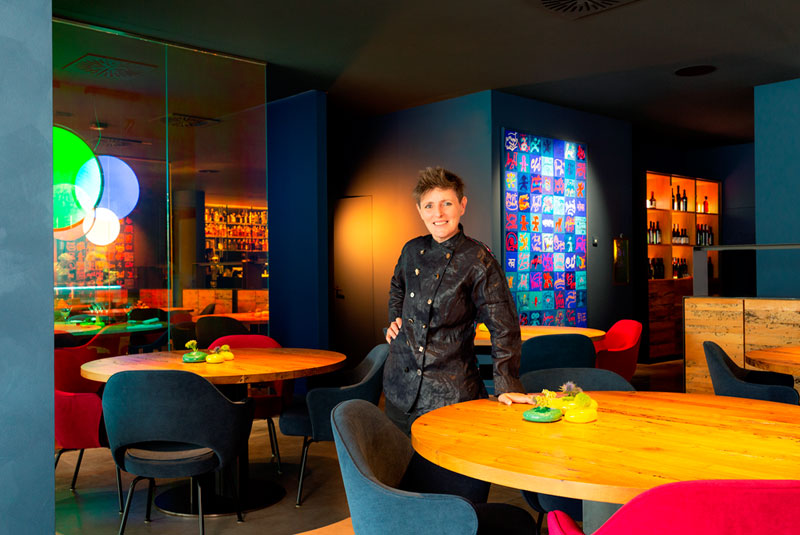
Varese inside Viva, with her manifesto art piece at the back (image: Sonia Marin)
Varese’s latest challenge – and, indeed, opportunity – came in June 2021 with the opening of her first restaurant in Sicily, W Villadorata Country Restaurant in the town of Noto, which the chef says is also a manifestation of her need to go back to her origins and the southern part of Italy. Doubling down on inclusivity, she sought to employ people over 60 who had lost their jobs during the pandemic but came up against new issues when looking for female employees.
“There is still a strong patriarchal aspect in southern Italy,” she reflects. “It’s the idea that a woman can only do this much before a man has to take over and he’s the one who makes the decisions. The idea of a woman being is charge still seems out there. As women, we also have to understand that we can make it in life. We have to get rid of certain cultural and family legacies that tell us that we can’t do what we want because first we need to have a child or look after the family.”
Surrounded by hills and countryside, W Villadorata also provided a chance for the chef to study Sicily’s biodiversity and she created a small vegetable garden in the hotel’s grounds. When this didn’t prove to be enough, she decided to collaborate with social cooperative Si Può Fare, which employs former drug addicts and people with mental health issues to look after a biodynamic garden in which Varese planted 100 seeds selected from her research into Slow Food presidia.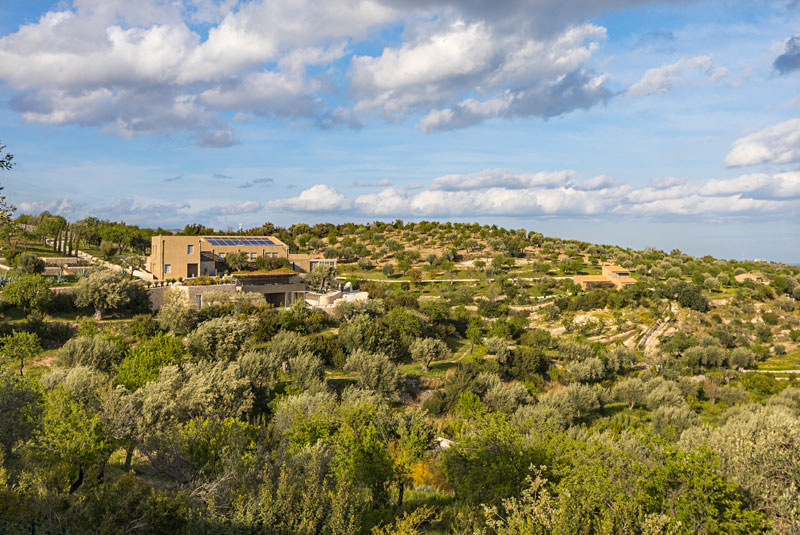
W Villadorata Country Restaurant's bucolic location in Sicily (image: Mattia Aquila)
Although hospitality is Varese’s area of focus, she believes gastronomy to be an amplified mirror of society. “You might not have problems of misogyny or homophobia in a city like Milan, but you only have to move 20km away to realise that we are still backward,” she says. “If cooking continues to be the realm of the white, heterosexual, male upper class, it will be the same in wider society too.”
Ice cream that sweetens society
It was during the Italian lockdown in late 2020 that Varese conceived her follow-up project. The chef was watching a news report about the Community of Sant’Egidio in Rome, a charitable organisation that at the time was offering refuge to a higher-than-ever number of women who had suffered domestic violence and left their homes.
“My brain started thinking about what I do and about jobs that don’t need a high level of training and I thought ‘Damn, ice cream!’,” she recalls. “Ice cream is democratic. Everybody eats it, you can make it with excellent raw materials and it still won’t cost the world. I said, ‘I’m going to open an ice cream shop and give these women work’. Offering them a job means offering them dignity, because it gives them the freedom not to have to depend on anyone anymore.”
As she waits for authorisation from the city council for use of a commercial space, Varese is already moving to find her next employees. She plans to collaborate with UNHCR, social services and a local women’s shelter to staff the ice cream shop, which she hopes to open in autumn 2021 with the help of the substantial donation she is receiving as part of the Champion of Change award, in partnership with S.Pellegrino.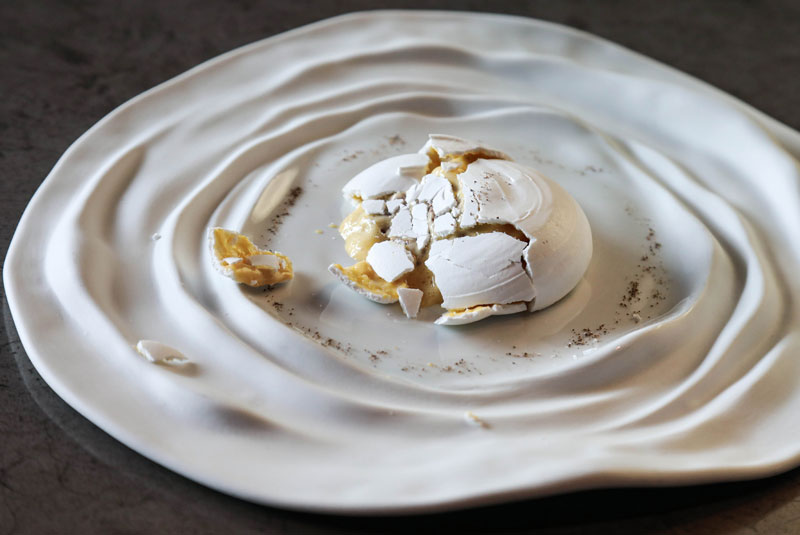
Varese's dessert 'Perfection doesn't exist' (image: Azzurra Primavera)
For the chef, this could be a pilot – the starting point for other hospitality venues with a similar purpose and an inspiration for young cooks getting into the industry. “What I love about the [Champions of Change] award is that it’s truly sustainable, it’s not just about the restaurant. It talks about various issues that are important today. It moves to break the balance, it’s disruptive,” says Varese.
“In the future, we definitely need to be more inclusive. To be more sustainable, not only in terms of the environmental aspects of food, but also corporate sustainability and building better teams after the pandemic destroyed them. We must do this even at the cost of increasing prices, because we have to motivate people not only to go out to eat, but also to come to work in a restaurant and make good food.”
Champions of Change, presented in partnership with S.Pellegrino, recognises and celebrates three unsung heroes of the hospitality sector who have used the extraordinary events of the last 18 months as a springboard to drive meaningful action. It is part of The World’s 50 Best Restaurants 2021 awards programme and the evolving ‘50 Best for Recovery’ initiative.
To be the first to hear about the latest news and announcements, join the community on Instagram, Facebook, Twitter and YouTube.
